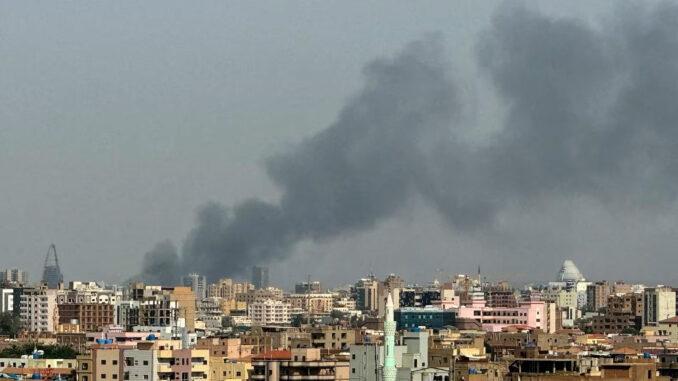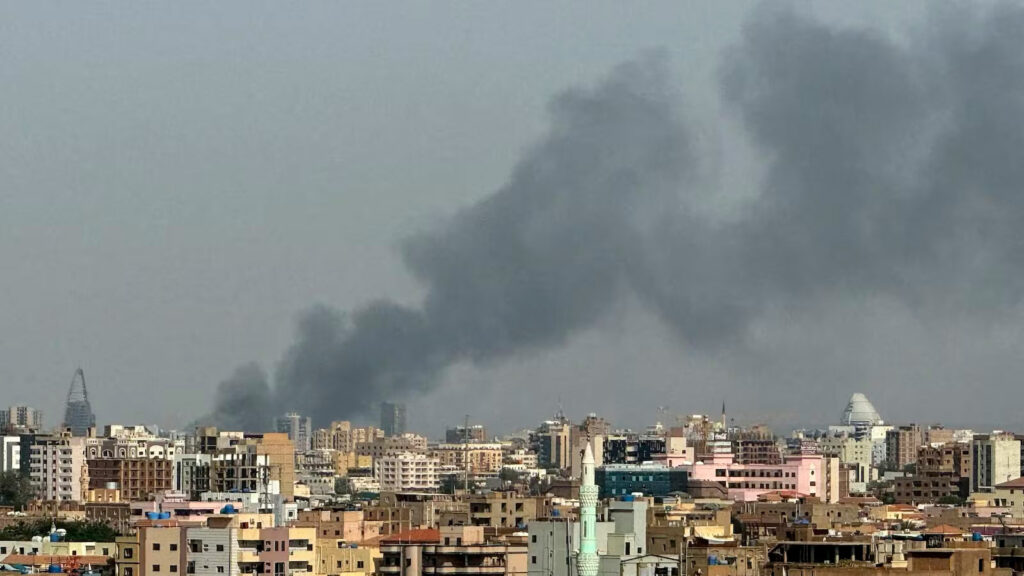
The attack on the Emirati ambassador’s residence in Khartoum by a Sudanese military aircraft has exacerbated tensions between the Sudanese army and the United Arab Emirates.
The conflict between the Sudanese army and the Rapid Support Forces (RSF) has escalated with the attack by a Sudanese military aircraft on the residence of the UAE ambassador in Khartoum. The incident, which took place against a backdrop of growing regional tensions, led the Emirates to denounce the attack as a serious act, and plan to lodge complaints with several international organizations. This event is part of a war that began in April 2023 and in which the role of the Emirates, although contested, remains at the center of diplomatic concerns.
Analysis of the incident: attack on the diplomatic residence
The air attack on the United Arab Emirates (UAE) ambassador’s residence in Khartoum is a worrying development that reflects the rapidly deteriorating security situation in Sudan. A Sudanese military aircraft severely damaged the building where Hamad Mohammed AlJneibi, head of the UAE diplomatic mission in Sudan, resides. Exact details of the damage have not been made public, but the diplomatic infrastructure has suffered extensive destruction.
The use of military means against a diplomatic representation is a serious violation of international law, in particular the 1961 Vienna Convention on Diplomatic Relations, which guarantees the protection of foreign missions. This violation could lead to sanctions or concerted diplomatic action by international institutions such as the UN, the African Union (AU) and the Arab League, which the UAE has referred the case to.
In April 2023, the conflict between the Sudanese Armed Forces (SAF) and the Rapid Support Forces (RSF) plunged the country into civil war, claiming thousands of civilian lives and severely disrupting the economy. The recent incident marks a further escalation of this crisis, with potential repercussions for diplomatic relations in the Gulf region.
Background to tensions between the United Arab Emirates and Sudan
Since the start of the conflict in 2023, the Sudanese government has repeatedly accused the UAE of supporting the RSF. Although the Emirates have denied any direct involvement in the conflict, their alleged involvement in supporting paramilitary groups continues to fuel tensions.
Diplomatic relations between the two countries, once cordial, have deteriorated in the wake of these allegations. It is essential to understand that the RSF, led by Mohamed Hamdan Dagalo, known as Hemedti, played a crucial role in Sudan’s political transition. Their economic ties with the Emirates, particularly in the field of natural resources and regional military operations, reinforced this perception of tacit support.
However, the Emirates intensified their efforts to distance themselves from the crisis and strongly condemned the attack on their ambassador. They announced that they would take the case to several international organizations to underline the seriousness of the act.

Diplomatic implications and legal recourse
An attack on a diplomatic residence can have serious international consequences. The UAE plans to lodge formal complaints with the UN, the African Union and the Arab League. This highlights the importance of diplomatic law and the protections afforded to diplomatic missions in conflict zones.
In terms of procedures, these organizations may, after investigation, impose sanctions against Sudan or engage in mediation between the two countries. For example, measures such as economic sanctions or the suspension of certain bilateral relations could be considered. Under international law, an attack on a diplomat or his property constitutes a serious offence and may be considered a threat to international peace. The direct impact of such an attack could also affect trade relations between Gulf countries and Sudan, particularly in strategic sectors such as energy and the export of natural resources.
International organizations often resort to economic sanctions in response to this type of incident. For example, the European Union has already imposed arms embargoes in similar contexts in Africa, aimed at limiting the military capacity of belligerent forces.
Future prospects for Sudan-UAE relations
The evolution of relations between Sudan and the UAE will be crucial in the coming months. The UAE’s strategy in the Gulf and Africa is based on strong economic and military partnerships, particularly with countries with strategic natural resources such as Sudan.
However, if these tensions persist, the Emirates could re-evaluate their investments in Sudan. The gold-rich Darfur region is a major area of interest for the Emirates, and any further escalation could affect extraction and trade. The conflict is also having an impact on the sea and air routes used for international trade, a strategic element for the Emirates who depend on trade routes to maintain their status as a regional hub.
If the Emirates continue to maintain a firm stance against Sudan on this issue, bilateral relations could face difficulties in the medium term. The African Union and the Arab League will have to play an active role to avoid a total breakdown in relations, notably by promoting regional peace talks.
War Wings Daily is an independant magazine.